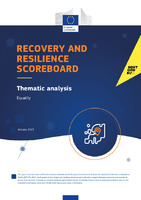| dc.contributor.author | European Commission |
| dc.date.accessioned | 2023-02-13T10:42:59Z |
| dc.date.available | 2023-02-13T10:42:59Z |
| dc.date.issued | 2023-01 |
| dc.identifier.uri | https://ketlib.lib.unipi.gr/xmlui/handle/ket/3903 |
| dc.description | This paper is part of a series of thematic analyses undertaken by the European Commission to illustrate the impact of the Recovery and Resilience Facility (RRF). The RRF is the European Union’s largest ever funding instrument and is intended to support European economies and societies to recover from the Covid-19 pandemic and build resilience against future shocks. EU Member States commit to implement ambitious reforms and investments and receive funds from the RRF when they achieve these commitments. Recovery and Resilience Scoreboard Thematic analysis Policy Overview Equality and the inclusion of disadvantaged groups are high on the EU's policy agenda. This thematic analysis outlines the contribution of the Recovery and Resilience Facility (RRF) to addressing inequalities in the EU. |
| dc.description.abstract | Equality and the inclusion of disadvantaged groups are high on the EU's policy agenda. This thematic analysis
outlines the contribution of the Recovery and Resilience Facility (RRF) to addressing inequalities in the EU. The fiche
provides an overview of the existing policy context in the EU and gives an overview of the measures that Member
States are taking in their national recovery and resilience plans (RRPs)1.
Women and men were impacted differently by the COVID-19 pandemic, and the crisis also significantly
affected specific groups such as refugees, people with disabilities, LGBTIQ people2, older people and
people with a migrant, minority racial or ethnic background, including marginalised Roma communities. In
addition, the pandemic and the measures to contain it hit disadvantaged groups harder. The crisis accentuated the
challenges that certain groups already faced. It further entrenched existing inequalities and discrimination, and
exacerbated social exclusion and marginalisation3. For those depending on help from others to take care of their
physical needs, physical distancing created major difficulties. Restrictive measures had an additional impact on mental
well-being, in particular of people who already relied to a high degree on their social circles. |
| dc.format.extent | 15p. |
| dc.language.iso | en |
| dc.publisher | Publications Office of the European Union |
| dc.subject | Disadvantaged situation |
| dc.subject | Gender Equality Strategy |
| dc.subject | European Regional and Development Fund |
| dc.subject | Asylum, Migration and Integration Fund |
| dc.title | Recovery and resilience scoreboard. Equality. |
| dc.type | thematic analysis |
| dc.publisher.place | Brussels |

